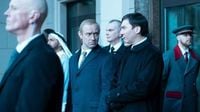Jude Law’s transformation into Vladimir Putin for Olivier Assayas’ new political thriller, The Wizard of the Kremlin, has set tongues wagging at the 2025 Venice Film Festival. Premiering on August 31 to a packed house in Venice, Italy, the film dives deep into the murky waters of Russian power politics, drawing on Giuliano da Empoli’s bestselling 2022 novel for inspiration. With a star-studded cast that includes Paul Dano, Alicia Vikander, Jeffrey Wright, and Tom Sturridge, the film has quickly become one of the festival’s most talked-about entries—though not always for the reasons its creators might have hoped.
Law, who underwent a striking physical transformation using prosthetics (but stuck with his own voice rather than adopting a thick Russian accent), described his approach to the role as measured and thoughtful. "I felt safe in the hands of Olivier. This is a story that was going to be told intelligently with nuance and consideration. We weren’t looking for controversy for controversy’s sake," Law remarked at the film’s official press conference, according to the Associated Press. He emphasized that his Putin is "a character in a much larger story," and not a caricature or an attempt to definitively pin down the Russian leader’s essence.
Assayas’ adaptation is more than just a biopic. The narrative unfolds from the chaotic aftermath of the Soviet Union’s collapse in the early 1990s, following the rise of Putin (Law) and his fictional advisor Vadim Baranov, played by Dano. Baranov, a composite character inspired by real-life Kremlin spin doctor Vladislav Surkov, is depicted as a former avant-garde artist and reality TV producer who morphs into the architect of Putin’s tightly controlled political system. As Dano explained, “The wizard is the person who is in the background, so there’s a casting of a spell that is happening.”
Assayas, best known for films like Clouds of Sils Maria and Personal Shopper, described the film as a meditation on the evolution of politics itself. "The film is very much about how modern politics, 21st-century politics were invented," he told reporters. "What’s going on right now is not only terrifying but it’s even more terrifying by the fact that we have not found the answer." He was quick to clarify, though, that the film is “not so much a political film as it is a film about politics—and the perversity of its methods, which now hold us all hostage.”
Production for The Wizard of the Kremlin took place in Latvia, as filming in Russia was off the table. The project was a collaboration between Curiosa Films and Gaumont, with support from France Télévisions and Disney+. Gaumont is handling French distribution and international sales, but as of now, the film’s North American release date remains up in the air.
The film’s 156-minute runtime didn’t deter critics from weighing in with gusto. According to Deadline, Damon Wise found the film “engrossing,” noting that it “offers a warning to the West about how that state of affairs came to be.” He praised Law’s performance, saying the actor captured “the President’s pout to perfection,” while Dano’s Baranov was “much more mysterious and mannered.” The International Cinephile Society gave the film four out of five stars, calling it “an engrossing tale on the power of corruption and the corruption of power.” Next Best Picture was similarly positive, awarding a score of 7/10 and commending the screenplay’s clarity, though they noted the script became “fairly repetitive” once Law’s Putin enters the scene.
Not everyone was convinced, however. Little White Lies described the movie as “mad and maddening,” criticizing it for abandoning its initial provocative tone in favor of a more somber, less effective reality. The Playlist went further, calling it “a bloated bore” and arguing that, despite its ambitions, the film lacked the philosophical and psychological depth of Russian literary classics. The Telegraph, in a mixed review, conceded that Law “captures frighteningly well the tics of Russia’s sociopath-in-chief,” even as it found the film itself lacking in energy. Meanwhile, The Times of London declared that “Jude Law is perfect as a petulant Putin,” and The Independent described him as “an intense, torso-baring Putin,” though it dismissed the film as “a mediocre drama.”
The cast and creative team were well aware of the risks involved in portraying such recent and controversial history. Law admitted, “I hope not naively, but I didn’t fear repercussions. I felt confident, in the hands of Olivier and the script, that this story was going to be told intelligently and with nuance and consideration.” Dano, for his part, sought to avoid easy moralizing, stating, “If you were to just label a character like Baranov bad, it would be a massive oversimplification that would do more bad than good. We need to be asking ‘Why?’”
Alicia Vikander, who plays Baranov’s on-again-off-again girlfriend, brought a different energy to the film. Her character, according to Assayas, was meant to embody “freedom” in a world dominated by men talking in closed rooms. “But Olivier told me that we need a world that shows the women who inhabit it also. A female counterpart but a very moral one as well,” Vikander explained.
Jeffrey Wright, who plays the journalist to whom Baranov tells his story, argued that the film’s resonance extends far beyond Russia’s borders. “This film is about a specific place but it has global implications for all of us,” Wright said. “Yes, we’ve had impulses toward fascism and autocracy and all manner of sins. But what we’ve also had from the very beginning, even within the original sins and that grotesqueness, the idea that we could be better. This idea that we could aspire towards some type of utopian perfectibility. If that is lost as it is now, we become the thing we see in the film.”
The timing of The Wizard of the Kremlin is impossible to ignore. As Russia’s war in Ukraine drags into its third year, the film’s themes—power, manipulation, and the dangers of unchecked authority—feel particularly urgent. According to Variety, Assayas sees the film as a cautionary tale about “the scary and dangerous situation that we all feel we’re in. It applies to a lot of authoritarian leaders.”
As the Venice Film Festival heads toward its awards ceremony on September 6, with The Wizard of the Kremlin competing alongside titles like Frankenstein, Bugonia, The Voice of Hind Rajab, La Grazia, and No Other Choice, audiences and critics alike are left to ponder the film’s provocative take on modern power. Whether the film is ultimately celebrated or criticized, it’s clear that Assayas and his cast have succeeded in sparking conversation—no small feat in today’s crowded cinematic landscape.
In a world where the lines between politics and performance are increasingly blurred, The Wizard of the Kremlin offers a mirror—sometimes flattering, sometimes deeply unsettling—reflecting both the past and the present back at us.



